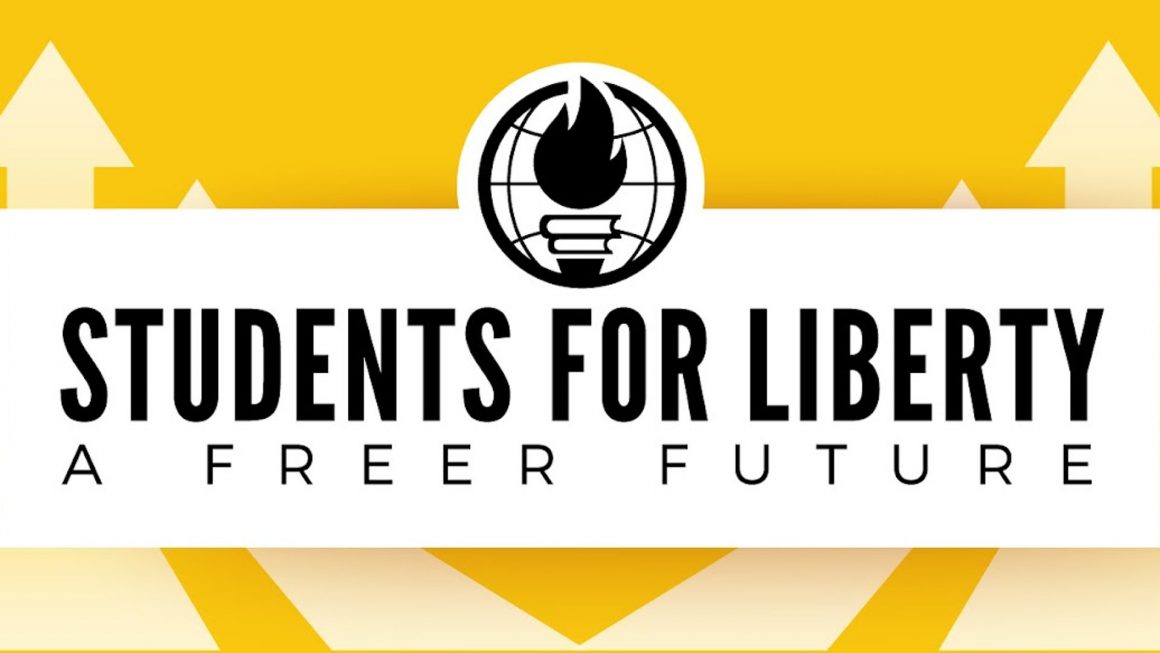
What is Students for Liberty? The organization influencing campus politics
By Thomas Knight, December 11 2024—
If you have passed by the tables in Science Theatres or Science B this semester, you may have noticed a certain club making its presence known. Adorned with yellow tablecloths, offering a wide selection of literature and merchandise and flanked by flashy banners sporting anti-taxation slogans, Students for Liberty has been hard at work marketing itself as a champion for the future of all students, regardless of their political leanings. As the University of Calgary chapter has opened up and begun holding events, it’s worth dissecting this global organization to understand its motivations—motivations that are more complex than the typical grassroots student group.
Students for Liberty (motto: “A Freer Future”) is an international network of student-run, campus-based groups with the mission of cultivating strong future leaders and advocates of liberty. The organization was born out of a desire, first articulated by a handful of summer interns in Virginia in 2007, for better communication among liberty-oriented students who want to advocate for liberty in all aspects of life. Since then, the number of countries with Students for Liberty branches has steadily increased to over 130. Each year, these young Adam Smiths, Ayn Rands, and J.S. Mills come together for their annual two-day liberty-themed conference in Washington, D.C., known as LibertyCon.
Students for Liberty assures skeptics that it is not a partisan effort to inject campus politics with right-wing or conservative ideals. For instance, the organization fully embraces the decriminalization of drug possession and advocates for governments to accept more refugees and immigrants—policies historically associated with the left. They also run an offshoot called Green Liberty, aimed at empowering youth to take climate and environmental initiatives into their own hands.
So, should those of us on both the right and the left take up arms and join the ranks of Students for Liberty? Before becoming a fervent libertarian, there are a few additional points to consider.
Students for Liberty has received more than $1 million USD from organizations directly connected to the Koch family, which it uses to host events and support local campus branches. This funding comes from billionaire Charles Koch and his family, whose conglomerate of petrochemical-related companies is one of the largest private companies in America. Advocacy groups and think tanks, including the Charles Koch Foundation, the Charles Koch Institute and the Cato Institute, all contribute to Students for Liberty.
Billionaires are not only funding an organization that advocates for less government regulation in the economy—presumably to increase their own revenue and lower their taxes—but they are also part of a complex relationship involving the Koch network, Students for Liberty, and, perhaps surprisingly, the tobacco industry. An investigation by Le Monde and The Investigative Desk reveals that starting in the 1980s, the tobacco industry, facing a lack of public opposition to tobacco control policies, aimed to create grassroots movements to give the impression of widespread public resistance to regulation. To achieve this, the tobacco industry received backing from think tanks and advocacy groups associated with the Koch network, including organizations like Citizens for a Sound Economy.
This process has slowly unravelled over the decades, and these grassroots movements have taken shape. Today, Students for Liberty is just one of many liberty-driven organizations funded by big tobacco and the Koch family of groups. For example, the World Vapers’ Alliance—an instance of big tobacco’s push for ‘harm reduction’—is funded by the Consumer Choice Centre, a direct offshoot of Students for Liberty. Students for Liberty, in turn, advocates against industry regulation as part of its campaign for liberty and supporting smokers’ and vapers’ rights movements.
It is unclear how the machinations of Students for Liberty’s supporters influence the University of Calgary group. While it is certainly true that its activities—prompting discussion and debate, holding social events—are a great way to boost our ailing campus political culture and learn about classical liberal values, we must also consider the implications of liberty and reflect on the extent to which this cultural revival should be shaped by outside actors with their own agendas.
This article is a part of our Opinions section and does not necessarily reflect the views of the Gauntlet editorial board.
